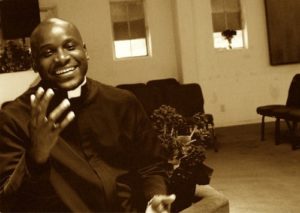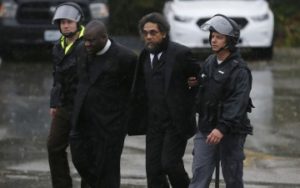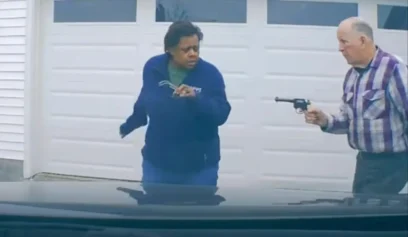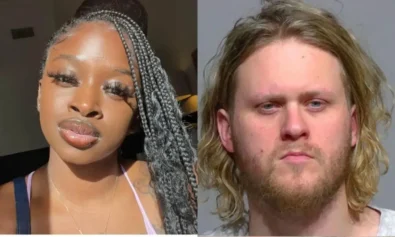
Pastor Michael McBride, director of the Live Free Campaign and founder of The Way Christian Center in California. Twitter.
“A well regulated Militia, being necessary to the security of a free State, the right of the people to keep and bear Arms, shall not be infringed.”
America has a deadly preoccupation with the Second Amendment to the Constitution, ratified on December 15, 1791, for the purpose of protecting the people against a hypothetical martial law scenario.
Now more than two centuries later, what was a safety precaution appears to be leading to a record number of fatalities.
Around 30 Americans are killed by guns on any given day of the year, and half of those victims belong to a group of people that make up just 6 percent of the national population: Black men.
Of these gun deaths in the Black community, 82 percent are homicides, and just 14 percent are suicides.
The firearm homicide rate among Black men aged 20-29 is 89 per 100,000, compared to 20 per 100,000 for white men of the same age, according to Centers for Disease Control and Prevention data.
The mass shooting in Orlando, like those in Newtown and Aurora before it, exposes the dangers of carte blanche interpretations of the right to bear arms in suburbia. But for many African-Americans living in inner cities, mass shootings are a daily occurrence.
While lawmakers continue to debate the issue of gun rights versus gun control on Capitol Hill, the Atlanta Black Star set out to find real people working on real solutions to the pervasive problem of gun violence in the African-American community.
Meet Michael McBride, Oakland-based pastor and director of the PICO National Network’s LIVE FREE Campaign, a nation-wide movement of faith-based leaders and organizations dedicated to confronting the origins of gun violence and crime in high-risk neighborhoods.
The Duke University Divinity School graduate is not afraid to get his hands dirty. He stood on the front lines with demonstrators in Ferguson, Missouri, following the high-profile police shooting of Michael Brown — getting pepper sprayed and arrested in the process. He has confronted White House officials during gun control forums in the wake of shooting massacres.

Pastor Michael McBride, left, and Cornel West, right, arrested by officers in Ferguson, Missouri, during protests over the shooting of Michael Brown.
In both instances, the minister appealed to federal and municipal leaders, law enforcement officials, policymakers and community organizations to unite to invest in data-driven, targeted peacemaking initiatives that will address victims of gun-related crimes in Columbine and Chicago.
“We have to make sure the narrative does not erase the millions of lives that are impacted everyday with gun violence in urban communities,” McBride told the Atlanta Black Star. “Gun control is [just] one part of that conversation.”
“It is a sad reality that many of our national elected officials and local elected officials know nothing about these life-saving strategies, so that’s a big campaign of ours to make sure that we’re pushing these strategies so it can be talked about just as frequently as background checks.”
The strategy, known as Ceasefire, calls for an alliance between clergy and community members, police departments and social service providers to send a direct message to a select group of young, mostly African-American men who have been identified through data analyses as the drivers of violence in their respective areas.
“All the data tells us less than half of 1 percent of any given city’s population is driving upwards of 60 percent of the gun-related homicides and shootings,” McBride said.
Religious leaders and outreach workers walk the streets of the “hot spot” neighborhoods to gather the active firearm offenders for group intervention sessions, where each is assigned a case worker.
“We’re going to have them in peace-making cohort groups and incentivize them to build a life plan, to get mental health counseling, to go on healing retreats, go get a vocational education,” McBride said. “We’re going to really invest in their healing and rehabilitation before they go to jail or they’re dead.”
McBride said the overwhelming majority of the young people put down their weapons because they are being presented with clear options, or alternatives, to the narrowly defined street culture they’ve grown accustomed to.
“Their conflicts are often a result of a system and an environment that has become predatory and conditioned them to respond with the violence they see, so they need us…to really intervene radically in their lives.”
In the last five years, McBride said, 70 percent of the participating cities saw double-digit decreases in homicide rates within 18 months.
In California, Oakland saw a 30 percent reduction in fatal shootings; Richmond saw a 60 percent drop to its lowest rate in 33 years; and Sacramento saw a 70 percent drop in firearm homicides. In Camden, New Jersey, homicide rates have dipped 42 percent since 2013.
The organization says the peacemaking policy often results in a dramatic change among law enforcement officials, who become less reliant on stop-and-frisk style patrolling measures in urban communities.
“The strategy is so successful because it then forces everyone who cares about these issues of peacemaking and gun-violence reduction to focus on that less than half of 1 percent rather than just driving down the street, pulling over ‘Pookie’ and ‘Ray Ray’ who fit a description,” McBride noted.
It is also worth noting that in Baton Rouge, Louisiana, where homicide rates went down by 33 percent as a result of the Ceasefire tactics, bystanders recently captured video of 37-year-old Alton Sterling being tackled and gunned down by police officers.
While the strategy has proven successful in several cities around the country, McBride said the reception from lawmakers has been lukewarm, at best.
“I think that people have a deep appreciation for the work that we are trying to do, but they don’t have the political will to invest in it or fight for it.”
“And I think this is probably the other side of the Black Lives Matter conversation, why it’s so necessary to demonstrate that Black lives matter,” McBride added, “because if the lives of Black folk in this country are so expendable — in the public consciousness and in the national political reality — that we’re not willing to save their lives through both prevention, intervention, enforcement and services, if we’re not willing to have a comprehensive and robust process, then Black lives really don’t matter that much to elected officials.”
McBride has personally appealed to officials, including Vice President Joe Biden, equipped with a brief written by former Assistant U.S. Attorney General and longtime gun violence researcher Ted Heinrich. The 2011 report outlines a $500 million federal investment that could dramatically reduce violence across the nation in a span of five years.
“Just to give you a sense, the budget of the Department of Justice by itself is about $7 to $10 billion,” McBride said. “It’s nothing, but you gotta have the political will to even be able to roll $500 million off your lips, right? And make an argument that you’re going to invest that in Southside Chicago, East Oakland, Miami-Dade County, Harlem, Brooklyn, etc. You gotta have the political chops and will to do that and that’s what we don’t have right now, but we’re going to make it so. I promise you that. We’re going to force the country to do it, because our lives matter that much.”
Next, McBride will appear on a July 12 panel at the Center for Faith & Justice in Berkeley, California. At the discussion, representatives from the Law Center to Prevent Gun Violence, a national center that provides legal assistance in support of gun violence prevention and “the promotion of smart gun laws that save lives,” according to its mission statement, and Gabby Giffords-led Americans for Responsible Solutions will present their new report: “Healing Communities in Crisis: Lifesaving Solutions to the Urban Gun Violence Epidemic.”
The joint effort lays out the community-based, peacemaking strategies.
The event will be streamed online to reach the greatest number of people, McBride said, before heading on the road.
“We’re going to go on a little bit of a tour across the country, just to educate people about this in about 15 cities over the next six months.”
Because the efforts are always data-driven, the group will focus on cities with the highest gun-related homicide and incarceration rates, McBride said.
“We’re going to help invest and build the capacity of faith leaders, movement leaders, law enforcement agencies that are really in the political apparatus to invest and stand up for strategies.”


